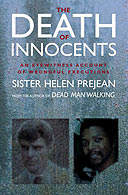
The Death of Innocents
by Sister Helen Prejean
Canterbury Press £12.99, pp310
One of the stranger coincidences of American life is that Louis Prejean, the brother of the ardent death-penalty abolitionist and nun Helen Prejean, is a close friend and shooting buddy of the conservative Supreme Court Justice Antonin Scalia. As this vivid, passionate and deeply researched book makes clear, no other judge has done more to make the execution of an innocent prisoner likely, by erecting dense thickets of procedural barriers to the introduction of fresh evidence in post-conviction appeals.
While professing that the killing of an innocent would constitute a 'tragedy', Scalia has issued the lead opinion in a long list of cases that most British lawyers find mind-boggling. In his and the court's majority view, it is now permissible in the United States to execute someone whose trial lawyer was drunk or asleep, for example, or whose lawyer once missed a filing deadline, so preventing compelling new testimony from ever being heard. It was after one of Scalia's hunting trips that Prejean chanced to meet him in the departure lounge at New Orleans airport, and their ensuing confrontation is one of the book's highlights.
Although the judge's nine children attest to his devout Catholic faith, he seems not to care that Pope John Paul II made the church's pro-life position consistent for the first time - opposing not only abortion, but also capital punishment - in part as a consequence of a theological correspondence with Sr Helen. Scalia, she reports, deals with this problem by stating that John Paul's rulings on the matter were not issued 'ex cathedra' - in common with almost all the church's teachings, including its ban on contraception.
Unlike its bestselling predecessor, Dead Man Walking, this book was written without the help of a ghost, and is all the better for it. Prejean manages to transmit all the compassion, fire and inspiration she conveys as a public speaker to the printed page. At its heart are accounts of the executions of two men spiritually counselled by Prejean, Dobie Williams and Joseph O'Dell, both of whom, she argues persuasively, were indeed wrongfully killed. It is impossible to read them without a sense of outrage. Their treatment, she writes, amounted to state-sponsored torture, spread over years.

